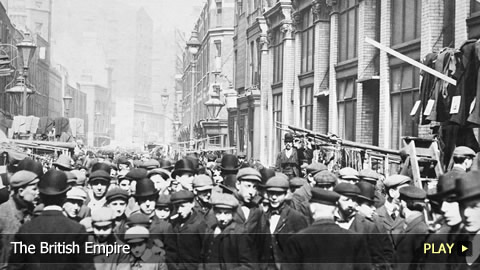The History of the British Empire

advertisement
VOICE OVER: Rebecca Brayton
The British Empire was, at the height of its influence, the most powerful empire in history, and was the chief global power for over a century. Beginning their quest at the end of the fifteenth century, Britain only reached the peak of its control during the twentieth century. The lasting impacts of this empire can be seen in the form of popular sports such as soccer, rugby and golf, the use of the British parliamentary system and in the spread of the English language throughout the world. In this video, http://www.WatchMojo.com explores the rise, dominance, and fall of this one-time world empire.
Following Portugal and Spain’s lead in overseas exploration, King Henry VII of England began to commission voyages across the Atlantic. Several unsuccessful attempts were made to create colonies along the North American coast under Queen Elizabeth I. It was in the early seventeenth century that, under the rule of King James I of England, the British Empire truly took a leap forward.
The first permanent settlement in the Americas under English rule was Jamestown, founded in 1607. In the decades that followed, progressively more popped up along the coast and throughout the Caribbean. A series of wars with France and the Netherlands throughout the seventeenth and eighteenth centuries eventually left Britain as the dominant colonial power.
This empire was tested, however, late in the eighteenth century. Thirteen of its North American colonies broke free from Britain through the American War of Independence, creating the United States of America. Despite this seemingly crushing blow, the British Empire pushed forward and shifted its focus towards Asia, the Pacific and Africa, growing larger than ever.
After being challenged by and eventually defeating Napoleon’s France in 1815, Britain was left with no major rivals. From this point until 1914, Britain would add 400 million people to their empire, along with 10 million square miles (or nearly 26 million square kilometers) of land, during what was referred to as their "imperial century."
The growth of Germany as a military and economic power forced Britain to form alliances with old enemies such as France and Russia in the lead-up to the First World War. In the short term, Britain benefited by receiving even more territory through the Treaty of Versailles. However the economic implications of the war spelled trouble for the empire in the long term.
1922 marked the height of the British Empire, when they held sway over one-quarter of the world’s population. However, World War II would leave Britain virtually bankrupt. With anti-colonization sentiments high, the dismantling of this once-dominant world empire began. While many colonies declared their independence in the decades that followed, many consider the handover of Hong Kong to China in 1997 as the end of empire for Britain.
Despite this, the British influence is still felt the world over. In addition to the 14 territories over which the United Kingdom still retains sovereignty, the empire also caused large migrations of people.
Across the world, many ex-colonies still use the British parliamentary system as the basis for their now independent governments. The British Empire was also responsible for creating some of the world’s most popular sports, including soccer, rugby and golf. However, arguably the British Empire’s largest mark on the world was the English language. The proliferation of the language increased with the spread of their rule, and today it is the mother tongue of roughly 400 million people worldwide.

